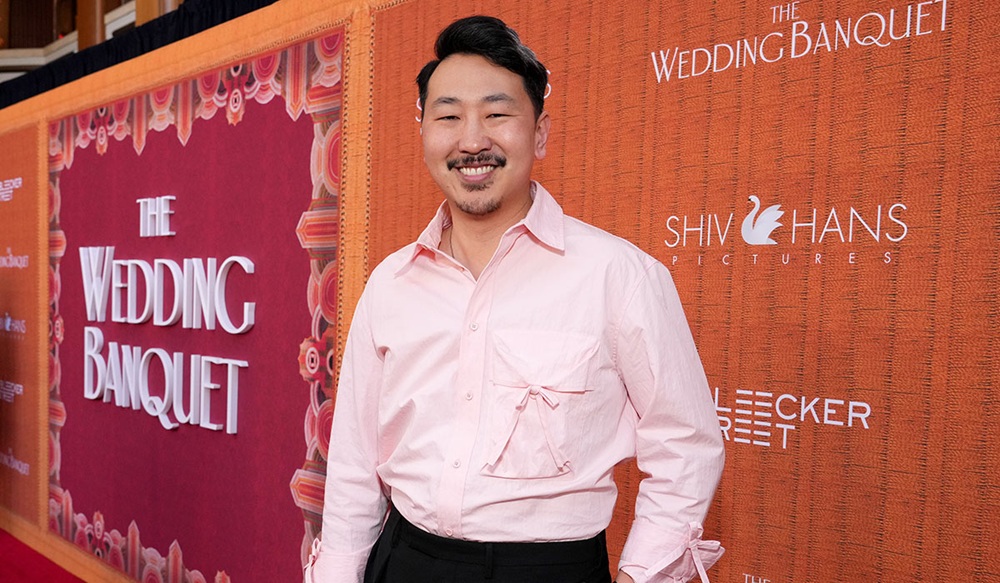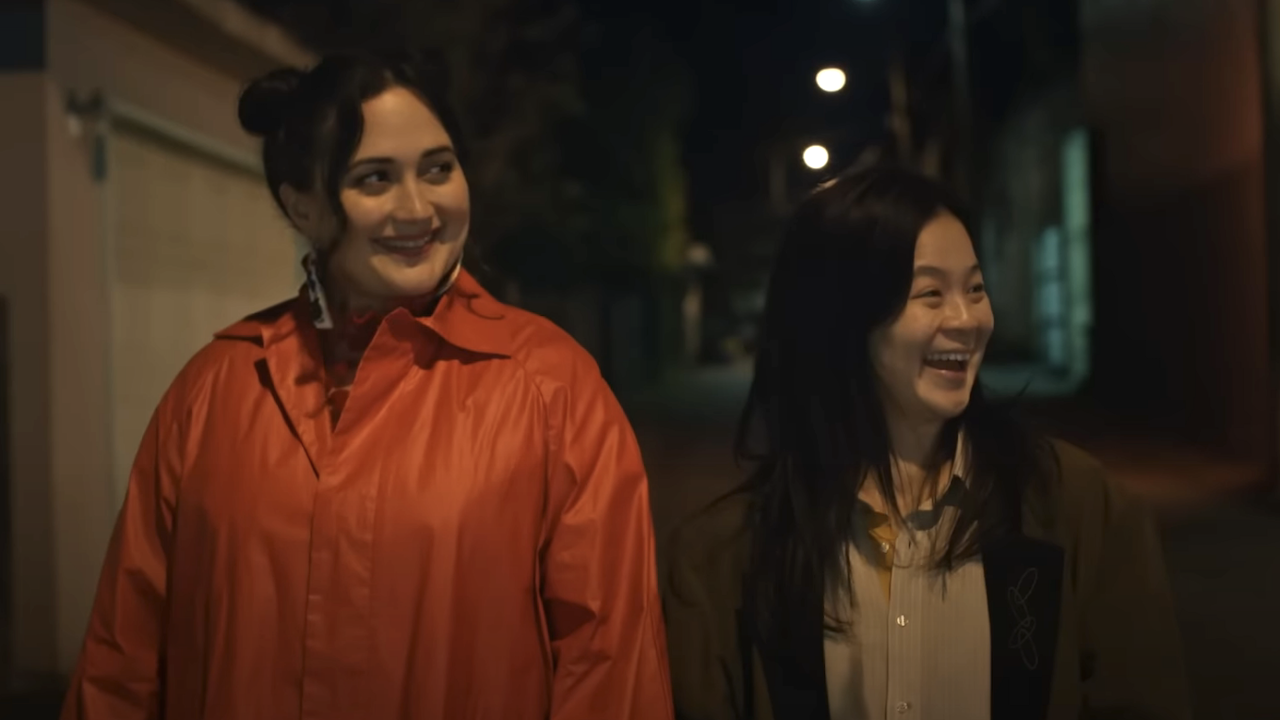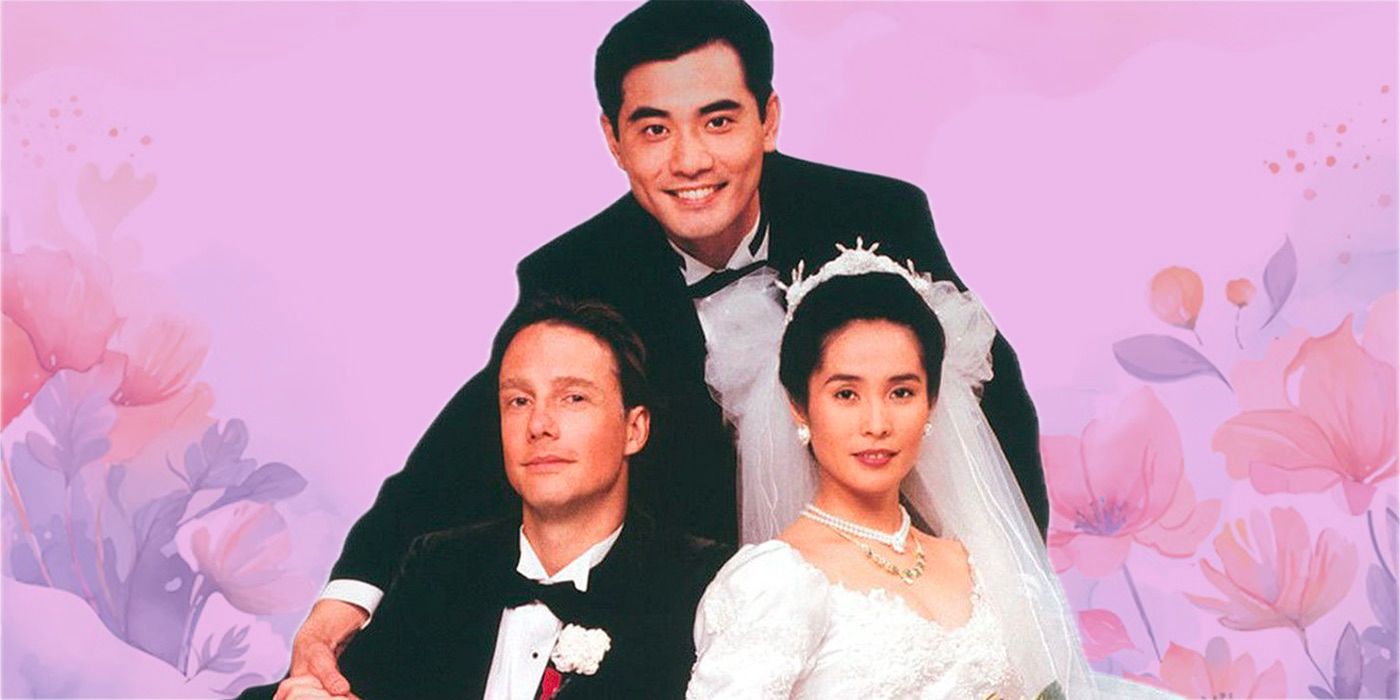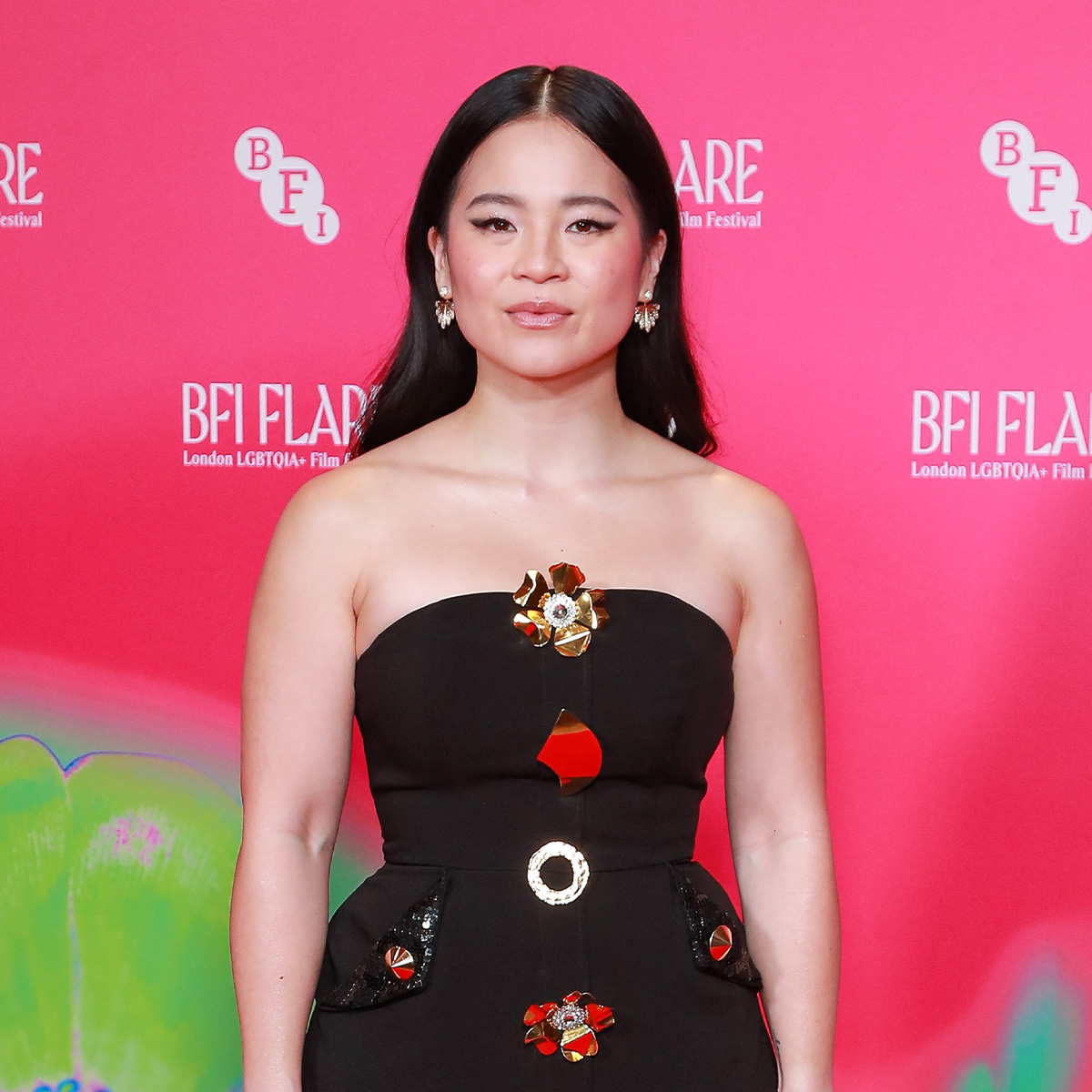Interview: Andrew Ahn on Queering Korean Tradition in 'The Wedding Banquet'
When filmmaker Andrew Ahn was eight, his mother rented Ang Lee’s 1993 film The Wedding Banquet from a video store owing to its status as an Asian film that white people were interested in. Unbeknownst to them, the titular wedding is but a front for a bisexual Taiwanese immigrant to get his green card and remain in America. The moment, something akin to an origin story, was also an awakening for a filmmaker who’d take particular interest in depicting the gay Asian-American experience on screen.
Released at a time when marriage is a significantly less static institution, Ahn’s remake, crafted in tandem with original co-writer James Schamus, also packs a subversive punch. In his reimagining of The Wedding Banquet, a quartet of queer friends living together in Seattle go all-in on an elaborate fake Korean wedding so Min (Han Gi-chan) can remain in America with boyfriend Chris (Bowen Yang). Angela (Kelly Marie Tran) agrees to be his bride in exchange for his funding IVF treatments for her and partner Lee (Lily Gladstone).
Yet through this artificial arrangement comes authentic connection across all characters in The Wedding Banquet. The result is a warm-hearted work that synthesizes elements from the director’s previous three features: the intimate gay alienation of Spa Night, the tender human drama of Driveways, and the crowd-pleasing comedy of Fire Island.
I spoke with Ahn ahead of The Wedding Banquet’s theatrical opening. Our conversation covered how he empowered his actors, including Joan Chen and Youn Yuh-jung, to make the characters their own, why an interest in intergenerational relationships recurs across his films, and what he hopes contemporary audiences take away from his spin on the material.
This film was really hard to conceptualize, write, and direct. I love rom-coms and screwball comedies, and [those genres are] very difficult to do while balancing the drama of the film and the heart of these characters. I really embraced a certain dynamic range. I didn’t want to shy away from the film’s messiness and spikiness because these characters are kind of a disaster. It felt very organic, but obviously we needed to engineer the movie. This is something that I really learned from James Schamus: This is a craft, and you have to build it intentionally.
At the same time, I did really want to have fun, be whimsical, and, in some ways, have the film be reflective of my own sense of humor and personality. I started to get the sense that the film was getting close in the edit when my editor said to me, “Watching the film is starting to feel like hanging out with you.” That felt really special. I will say, it’s also gotten me into a little bit of trouble, because now if people don’t like the movie, it feels a little personal. [laughs] So I’m trying to distance myself a little bit from the movie!
For sure. I remember re-watching Spa Night with a few years’ distance, and it did remind me of a younger self. I’m in a different life stage now that’s very reflected in The Wedding Banquet. I’ve had many conversations about getting married and having children with my boyfriend that are a little too close to what’s in the movie. There’s a line in the film where Angela says, “If it happens, it happens,” about a kid, and that was a line verbatim that my boyfriend said to me. I think it’s true about any filmmaker that you age into your movies, and I think that that’s really exciting and interesting. Your films should always reflect who you are in some way.
I couldn’t have expected this career. If you told me that I would be reimagining The Wedding Banquet right after 2016 Sundance with Spa Night, I don’t think I’d believe you. I’ve followed my instincts and interests as a person, but I’ve had to really understand and play ball with the industry and the market because filmmaking is such an expensive medium. It’s not like writing a novel; you have to spend so much money. It’d be naïve to ignore the business part, but as much as possible, [I’m] holding true to a certain set of priorities for me as a gay and Asian storyteller.
He and I had a long debrief that evening, which was hard because I was exhausted. But I was so happy that he told me that he felt like he understood me better through the film. That’s the best outcome I could have asked for. Any additional praise or success for the film, that’s all just a bonus. I really believe that when filmmakers make movies, they have to have some interior reason for making them and not rely on the box office or critical success to define their success.
I think it’s really important as a director to create an environment that supports your actors to play, bring themselves into the film, and let them feel like they have some ownership of the character and the film. I think if you create that environment, even if people interpret it in different ways and it manifests in different ways, I think there’s still a core philosophy that remains the same. It’s a level of authenticity, like the fact that Lily Gladstone asked if she could make this character Duwamish. That made that character resonate more for her. Of course, even in scenes where that isn’t necessarily mentioned, it’s going to show in the performance. Lily’s from Seattle, and I asked her, “Where do drunk people go to grab a bite?” And she said, “Oh, they go to Dick’s. They grab a bag of Dick’s.” We put that into the movie, and I think she was really tickled by that. It showed her that we were listening. That process is really important.
Youn Yuh-jung, when we sent her the script, that character was initially Min’s mother. She was very humble and said that she felt a little old playing that character’s mother, but what if we made her a grandma? We talked about the difference that that dynamic might make, and I saw this spark in her eye and an artist’s inspiration. As a director, when you see that happen, you stoke it. I think it led to a really beautiful element of the film.

As I’ve gotten older, [I’ve increasingly understood] the value of my parents in my life. I understand their humanity more and more, and I realize that everything I do connects back to them. In this film, if we’re talking about preparing the next generation for parenthood, how can you not talk about the people who raised you? It’s an incredibly fruitful and important topic, and I think that there are so many stories you could tell with different contexts and nuances.
I think it’s really funny that Joan Chen’s character is too accepting of her gay daughter. That, to me, is such a weird modern context. At the core, that storyline is very similar to Min’s grandmother’s storyline. These are two matriarchs who are applying a different set of priorities to their children or grandchildren and, through the story of the film, have to understand that the people they raised have their own priorities that they have to acknowledge now.
That, to me, is a very important life lesson and something that’s not easy to do. I do think that it’s very difficult to treat people with humanity, unfortunately. It’s just not our nature. We’re very selfish. So to show a process of understanding and compassion that’s hard I hope will inspire people to make this a lifelong goal. You don’t understand how to parent when you win an award. It’s something that you have to continually work on.
Throughout my career, I’ve been really interested in ritual as an opportunity to mark time and to express yourself. My brother got married 10 years ago, and he had a traditional Korean wedding. I saw how that brought him closer to my parents, to his wife, and to his Korean identity. I was very jealous that I couldn’t participate in that as a gay man, so I wanted to show these rituals in this film and be able to make it feel more inclusive by making fun of it a little bit.
It’s like, “How can we queer these traditions?” Like that moment between the family with the chestnuts and the jujubes, not knowing which one represents the sons and which ones represent the daughters, and then Kendall [a friend of the couple played by Bobo Le] saying, “They’ll have 15 non-binary children.” I think the only way that you can shift a culture is to make culture. For me, I’m very committed to making queer and Asian films because I think it’s through the artwork that you can show people that these traditions can adapt and be more inclusive.
I hope that artists are excited to see my work and are inspired to tell their own stories. I know that there are gay and Korean people out there [for whom] this isn’t exactly their experience. They might not care about Korean weapons, and that’s totally cool. But if it inspires them to make something that’s personal to them, that feels so fulfilling. So much of what has really hurt us as a society isn’t being able to express ourselves. I think that the power of expression allows us to feel confident in who we are and inspires us to take care of each other.
Since 2001, we've brought you uncompromising, candid takes on the world of film, music, television, video games, theater, and more. Independently owned and operated publications like Slant have been hit hard in recent years, but we’re committed to keeping our content free and accessible—meaning no paywalls or fees.
If you like what we do, please consider subscribing to our Patreon or making a donation.
You may also like...
Diddy's Legal Troubles & Racketeering Trial

Music mogul Sean 'Diddy' Combs was acquitted of sex trafficking and racketeering charges but convicted on transportation...
Thomas Partey Faces Rape & Sexual Assault Charges

Former Arsenal midfielder Thomas Partey has been formally charged with multiple counts of rape and sexual assault by UK ...
Nigeria Universities Changes Admission Policies

JAMB has clarified its admission policies, rectifying a student's status, reiterating the necessity of its Central Admis...
Ghana's Economic Reforms & Gold Sector Initiatives

Ghana is undertaking a comprehensive economic overhaul with President John Dramani Mahama's 24-Hour Economy and Accelera...
WAFCON 2024 African Women's Football Tournament

The 2024 Women's Africa Cup of Nations opened with thrilling matches, seeing Nigeria's Super Falcons secure a dominant 3...
Emergence & Dynamics of Nigeria's ADC Coalition

A new opposition coalition, led by the African Democratic Congress (ADC), is emerging to challenge President Bola Ahmed ...
Demise of Olubadan of Ibadanland
Oba Owolabi Olakulehin, the 43rd Olubadan of Ibadanland, has died at 90, concluding a life of distinguished service in t...
Death of Nigerian Goalkeeping Legend Peter Rufai

Nigerian football mourns the death of legendary Super Eagles goalkeeper Peter Rufai, who passed away at 61. Known as 'Do...




